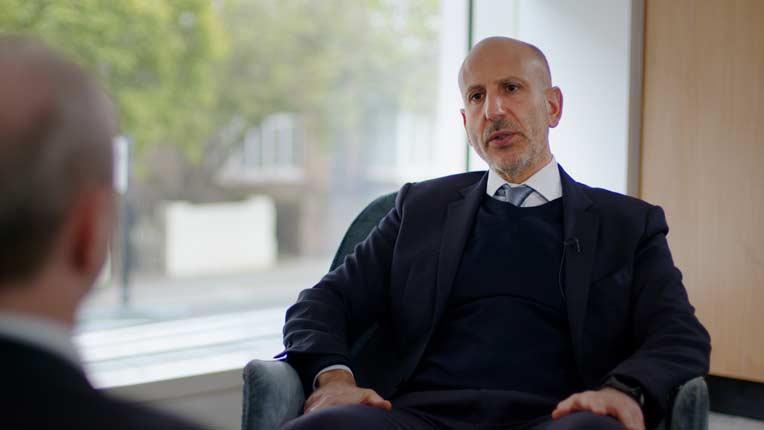Europe is attracting an increasingly sizable portion of global fund managers’ assets, with investors overweight Eurozone equities for the first time since November 2009, according to a recent survey of global fund managers. Receding recession fears in Europe, combined with frustration at Japan’s underperformance and concern regarding the US recovery, have led to global managers viewing Europe as the cheapest global region in terms of equities.
Pacific Swings and Atlantic Roundabouts
The results of the BofA Merrill Lynch monthly survey, which in August quizzed 187 asset allocators, managing a total of $513 billion assets internationally, suggest that both the Eurozone and the UK, while not yet flourishing, are considered ‘relatively less bad’ than other geographies. A net 11% of survey participants are now overweight Europe and a net 2% are underweight the UK—not the most exuberant of readings but still the most positive on the UK in over three years. Counterbalancing these moves, both the US and Japan have experienced sharp cuts so that a net 14% and a net 27% of investors are now underweight the regions, respectively, the survey shows.
Economic perceptions have formed a cautious and careful consensus on global growth. Though it may not be a particularly strong endorsement but the downward trend has stopped, at least, with a net 5% of investors forecasting a stronger global economy over the next 12 months.
Dunkin’ Doughnuts or Croissants?
The shift out of the US has been spurred by spiralling negativity around the region—something that looks likely to remain at present as economic data continues to struggle to meet expectations. It seems fair to suggest that it’s going to take a substantial surprise on the upside to persuade investors to reverse their negative sentiment. European sentiment has been buoyed by the perception that, though individual European countries are facing debt crises, at least local governments have started to act and are taking steps to gain control of the region’s crisis.
On the flipside, the US is still facing a lot of uncertainty, particularly with the mid-term elections coming up. And if there’s one thing that markets—and investors—hate, it’s uncertainty. Looking at the UK, it’s hard to say why investors are less pessimistic overall, but the conclusion of the British general election, the resultant government’s steps towards austerity, or maybe just a lack of alternatives have all been suggested as contributing to the gradual shift. Sticking with austerity measures, the BofA Merrill Lynch survey revealed this month that global investors now expect the Federal Reserve to keep interest rates on hold until at least the second half of 2011—sentiment echoed by European asset allocators with regards to the European Central Bank’s monetary policy plans.
Empire of the Sun?
Turning to Japan, survey respondents had already dropped their exposure to the region before this week’s confirmation that Japan is no longer the second largest economy in the world—a title that has instead been taken up by China—following weaker-than-expected economic growth in the second quarter. It seems that global investors are stepping back from Japan in part due to frustration at underperformance. But Japanese equities underperforming is not a new trend. “Japan’s stock market has been in general decline for the last ten years; TOPIX has posted an annualised loss of 2.2% over that period,” comments Morningstar fund analyst Muna Abu-Habsa. “Looking at the Morningstar Japan Large-Cap Equity category, it is apparent that the average Japanese equity manager has failed to outperform the index—the average fund in the category shed a larger 3.8% annualised over the last ten years and investors have been left largely disappointed,” Abu-Habsa says. “It’s therefore no surprise that investors are losing patience with Japanese equities”
The trend over the last decade suggests that the appetite for Japanese and European assets is inversely related. Indeed, the latest spike in global investors overweighting Japanese equities occurred at the peak of the European sovereign debt crisis earlier this year, as managers sought a safer harbour away from the EU. The reversal of this attitude is a cautious sign that Europe is recovering in the eyes of investors, at least when compared to other developed markets. Recent growth data from Germany has undoubtedly helped to bolster confidence, in spite of remaining concerns around periphery European economies.
Looking back at Japan, the slide in investor exposure has coincided with the strengthening of the local currency, so that now a net 62% of the fund managers quizzed by BofA Merrill Lynch view the yen as overvalued—the highest reading in the history of the survey. This strengthening has certainly played a role in hampering economic growth, confirms Nathan Gibbs, manager of the Schroder ISF Japanese Equities Alpha fund: “A weak economy, flagging overseas and domestic demand and a strong yen has stalled export-led Japanese company earnings and led to disappointing second-quarter GDP figures.” It’s not all doom and gloom, however; Gibbs points to robust growth seen in the emerging markets as cause for optimism. “China’s rapid expansion is an enormous opportunity for Japan, and for the whole of Asia,” he adds. In a panel discussion on emerging markets at the Morningstar Investment Conference in Chicago earlier this year, fund managers debated the merits of China and one manager, Charles de Vaulx of IVA Worldwide, raised the point that he prefers to buy Japanese stocks as a means of accessing China through the “back door”.
“China is already Japan’s most significant economic partner, in terms of imports, exports and investment,” says Schroders’ Gibbs, “and as growth in China moves from capital investment to personal consumption, this relationship should continue to benefit companies across Japan and the rest of the region.”
When it comes to investing in equities, the global emerging markets remain asset managers’ region of choice—albeit to a less extreme level than seen in previous months, according to this month’s fund manager survey.
Sunny Side Up
The overall sentiment regarding the global investing climate may be one of caution, but it’s a marked improvement on previous readings, and with global asset managers still stubbornly underweight bonds and moderately overweight equities, it sends an encouraging sign to individual investors. It seems the dark cloud that was hanging over Europe mere months ago has lightened to a paler shade of grey, with possible shafts of sunlight in certain areas.
Dea Markova, assistant online editor for Morningstar.co.uk, contributed to this article.























